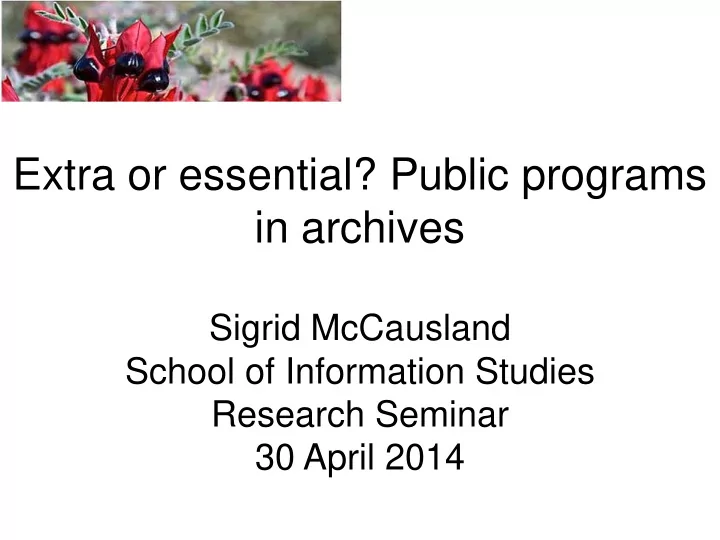

Extra or essential? Public programs in archives Sigrid McCausland School of Information Studies Research Seminar 30 April 2014
Overview • the relationship between archives and their publics • archival institutions not traditionally user- centred • internal tensions between records-focused and user/public oriented responsibilities
Which methodology fits? • Historiography ‘Historical studies of archival science, recordkeeping and archival practice, archival institutions, the profession, development of national or regional archival traditions, key figures in the profession.’ (McKemmish & Gilliland, Research Methods, p. 96) • Ethnography Ethnography & ethnology which includes ‘In- depth studies of archival practices such as reference services’ (McKemmish & Gilliland, Research Methods, p. 97) • Or something else?
…that fine institution, the National Archives. Not as well-known or frequently visited as the National Library, the Archives is the principal repository of government papers and turned out to be a friendly and user- friendly place, full of fascinating displays, and, yes, secrets. Source: Adams, P. (2014). In Burgmann, M. (Ed). Dirty secrets: Our ASIO files. p.175.
Australian Archives 1981 Institutional Priorities: High – Disposal Medium - ? Low – Reference No – Exhibitions ________________ ‘an unobtrusive central service agency’ Source: Golder, H. (1994). Documenting a nation…p.41.
Public programs are tools that support and enhance other archival functions, including research, reference, preservation, and collecting. They can be highly educational, both for planners and participants; they can foster a greater appreciation for history and historical records; and they help ensure firm and continuing support for archival endeavours. Source: Pederson, A. & Casterline, G. (1982), Archives and Manuscripts: Public Programs,p.8
In writing and talking about programs for the public, archivists often use the term outreach . At the National Archives we prefer the term public programs . This is not only because it is the term used by other national cultural institutions but also because it focuses explicitly on the public. Source: Hyslop, G. (2002). For many audiences…p.49
Advocacy as a political- and policy-focused activity to convince a targeted audience to act is distinguished from archival public programming that is centered around outreach, publicity, exhibitions, and reference services. Elves, D. (2012). Advocating electronic records… http://mspace.lib.umanitoba.ca/bitstream/1993/14234/1/Elves_Daniel.pdf
It is no exaggeration … that most archival concepts of public service have been developed in isolation, divorced from acquisition/appraisal and arrangement/description. Source: Cook, T. (1990-91). Viewing the world upside down, p.126
And yet, who can blame those who work in the reference and public programming areas of archives for feeling alienated from the professional mainstream, and thus developing their own theoretical approach based on users rather than materials? Source: Cook, T. (1990-91). Viewing the world upside down, p.126
Although the multiplicity of archives' roles in public affairs is one of the most striking recent developments in the archival world, it remains a minor feature of public programming. It does not play the central role it could in pursuing what is arguably the top priority for archivists - changing public attitudes towards archives. Source: Nesmith, T. (2010) . Archivists and public affairs…p.169
…'new public programming' would have two interrelated dimensions: greater commitment to the history of records and archives and more active pursuit of a wider role for archives in public affairs. The two come together as archivists employ their knowledge of records and archiving to help identify and contextualize records for public affairs purposes. Source: Nesmith, T. (2010). Archivists and public affairs…p.171.
Websites to browse • www.naa.gov.au • www.nara.gov • www.archives.govt.nz • www.nationalarchives.gov.uk
Conclusion • Where to now? • Your thoughts… thanks for attending!
Recommend
More recommend